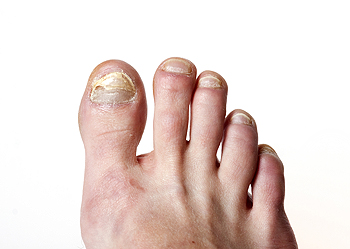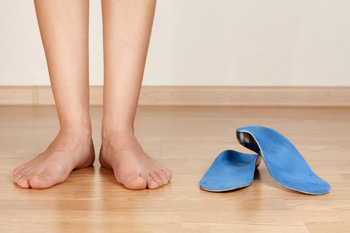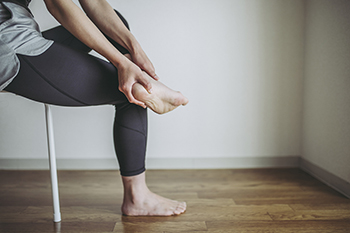Items filtered by date: September 2021
Tips to Make Sure Your Shoes Fit Right
 Good foot care is key to preventing potential foot problems in the future, and wearing shoes that fit properly is important. There are many things that can be done to assure that your shoes fit properly. Because our feet are at their largest at the end of the day, that is the best time to measure the feet. Many people have one foot that is bigger than the other, and it is important to make sure that the shoe fits the larger foot. Another important thing for shoe fitting is to make sure that there is around half an inch of space between your toes and the edge of the shoes. The ball of the foot should fit comfortably at the widest part of the shoe. Lastly, the heels should fit properly without slipping. If you have questions or concerns about making sure that your shoes fit correctly, please consult with a podiatrist.
Good foot care is key to preventing potential foot problems in the future, and wearing shoes that fit properly is important. There are many things that can be done to assure that your shoes fit properly. Because our feet are at their largest at the end of the day, that is the best time to measure the feet. Many people have one foot that is bigger than the other, and it is important to make sure that the shoe fits the larger foot. Another important thing for shoe fitting is to make sure that there is around half an inch of space between your toes and the edge of the shoes. The ball of the foot should fit comfortably at the widest part of the shoe. Lastly, the heels should fit properly without slipping. If you have questions or concerns about making sure that your shoes fit correctly, please consult with a podiatrist.
Finding a properly-fitting shoe is important in reducing injuries and preventing foot problems. For more information about treatment, contact Dr. Tupper from Coshocton Foot Health Center. Our doctor will treat your foot and ankle needs.
Proper Shoe Fitting
A common concern when it comes to foot health, having properly fitted shoes can help prevent injuries to the foot. Out feet affect our posture and gait, which in turn affects the biomechanics and overall bodily structure. With 33 joints, 26 bones, and over 100 ligaments, the potential for serious injury is much greater than one realizes. Although the feet cease growth in adulthood, they still change shape as they mature. Here are some factors to consider when it comes to investing in proper fitting shoes:
- Be sure the shoes fit correctly right away
- Ensure the ball of your foot fits comfortably in the widest portion of the shoes
- Even though they may look fashionable, improper fitting shoes can either create adverse conditions or exacerbate existing ones you may already have
- Walk along a carpeted surface to ensure the shoes comfortably fit during normal activity
Keeping in mind how shoes fit the biomechanics of your body, properly-fitting shoes are vitally important. Fortunately, it is not difficult to acquire footwear that fits correctly. Be sure to wear shoes that support the overall structure of your body. Do your feet a favor and invest in several pairs of well-fitted shoes today.
If you have any questions please feel free to contact our office located in Coshocton, OH . We offer the newest diagnostic and treatment technologies for all your foot and ankle needs.
Types of Orthotics for Plantar Fasciitis
If you have plantar fasciitis, an inflammation of the ligament that runs along the bottom of the foot, then you likely deal with foot and heel pain. One way to relieve plantar fasciitis symptoms is to wear orthotics. There are several different types of orthotics used to treat plantar fasciitis. Heel cups or pads are placed in the back of your shoes. They lift up the heel slightly and cushion it, relieving tension in the Achilles tendon and plantar fascia. Shoe insoles are inserted into the shoes and run along the entire sole of the foot. They support the foot arches to reduce strain on the plantar fascia ligament. Night splints are devices that hold the foot in place while you sleep, gently stretching your ligaments and tendons to avoid heel pain in the morning. To find out if orthotics are right for you, please consult with a podiatrist.
If you are having discomfort in your feet and would like to try orthotics, contact Dr. Tupper from Coshocton Foot Health Center. Our doctor can provide the care you need to keep you pain-free and on your feet.
What Are Orthotics?
Orthotics are inserts you can place into your shoes to help with a variety of foot problems such as flat feet or foot pain. Orthotics provide relief and comfort for minor foot and heel pain but can’t correct serious biomechanical problems in your feet.
Over-the-Counter Inserts
Orthotics come in a wide variety of over-the-counter inserts that are used to treat foot pain, heel pain, and minor problems. For example, arch supports can be inserted into your shoes to help correct overarched or flat feet, while gel insoles are often used because they provide comfort and relief from foot and heel pain by alleviating pressure.
Prescription Orthotics
If over-the-counter inserts don’t work for you or if you have a more severe foot concern, it is possible to have your podiatrist prescribe custom orthotics. These high-quality inserts are designed to treat problems such as abnormal motion, plantar fasciitis, and severe forms of heel pain. They can even be used to help patients suffering from diabetes by treating foot ulcers and painful calluses and are usually molded to your feet individually, which allows them to provide full support and comfort.
If you are experiencing minor to severe foot or heel pain, it’s recommended to speak with your podiatrist about the possibilities of using orthotics. A podiatrist can determine which type of orthotic is right for you and allow you to take the first steps towards being pain-free.
If you have any questions please contact our office located in Coshocton, OH . We offer the newest diagnostic and treatment technologies for all your foot and ankle needs.
Who Should I See To Treat Toenail Fungus?
 Your podiatrist can help you take care of not only your feet and ankles, but also your toenails. One very common condition that podiatrists treat are fungal toenail infections. These infections often start as athlete’s foot, a skin infection, before spreading to the toenails, although they can also occur on just the nails. Symptoms of toenail fungus include changes in the texture, color, and shape of the nail. The nail may become crumbly, brittle, or thickened and develop yellow, white, or brown spots. In more severe cases, the nail can change shape, separate from the nail bed, emit a foul odor, and make wearing shoes uncomfortable. If you have toenail fungus, and particularly if you have toenail fungus and diabetes, it is suggested that you see a podiatrist for treatment.
Your podiatrist can help you take care of not only your feet and ankles, but also your toenails. One very common condition that podiatrists treat are fungal toenail infections. These infections often start as athlete’s foot, a skin infection, before spreading to the toenails, although they can also occur on just the nails. Symptoms of toenail fungus include changes in the texture, color, and shape of the nail. The nail may become crumbly, brittle, or thickened and develop yellow, white, or brown spots. In more severe cases, the nail can change shape, separate from the nail bed, emit a foul odor, and make wearing shoes uncomfortable. If you have toenail fungus, and particularly if you have toenail fungus and diabetes, it is suggested that you see a podiatrist for treatment.
For more information about treatment, contact Dr. Tupper of Coshocton Foot Health Center. Our doctor can provide the care you need to keep you pain-free and on your feet.
Toenail Fungus Treatment
Toenail fungus is a condition that affects many people and can be especially hard to get rid of. Fortunately, there are several methods to go about treating and avoiding it.
Antifungals & Deterrence
Oral antifungal medicine has been shown to be effective in many cases. It is important to consult with a podiatrist to determine the proper regiment for you, or potentially explore other options.
Applying foot powder on the feet and shoes helps keep the feet free of moisture and sweat.
Sandals or open toed shoes – Wearing these will allow air movement and help keep feet dry. They also expose your feet to light, which fungus cannot tolerate. Socks with moisture wicking material also help as well.
If you have any questions please feel free to contact our office located in Coshocton, OH . We offer the newest diagnostic tools and technology to treat your foot and ankle needs.
What Is Plantar Fasciitis and Where Does It Occur?
The plantar fascia is the band of tissue on the soles of the feet that connect the front of the foot with the arch and the heel. When that tissue becomes inflamed due to stress or excessive stretching, plantar fasciitis can occur. Factors that can contribute to plantar fasciitis may include prolonged standing without proper footwear support, being overweight, having flat feet, high arches, or tight calf muscles. Pain from plantar fasciitis is often worse after sitting for a long period of time or in the morning, because the plantar fascia can contract while you are inactive or sleeping. If you have heel pain, it is suggested you make an appointment with a podiatrist who can examine you to make a proper diagnosis, and help treat whatever condition you may have using a variety of treatments and therapies.
Plantar fasciitis can be very painful and inconvenient. If you are experiencing heel pain or symptoms of plantar fasciitis, contact Dr. Tupper from Coshocton Foot Health Center. Our doctor can provide the care you need to keep you pain-free and on your feet.
What Is Plantar Fasciitis?
Plantar fasciitis is the inflammation of the thick band of tissue that runs along the bottom of your foot, known as the plantar fascia, and causes mild to severe heel pain.
What Causes Plantar Fasciitis?
- Excessive running
- Non-supportive shoes
- Overpronation
- Repeated stretching and tearing of the plantar fascia
How Can It Be Treated?
- Conservative measures – anti-inflammatories, ice packs, stretching exercises, physical therapy, orthotic devices
- Shockwave therapy – sound waves are sent to the affected area to facilitate healing and are usually used for chronic cases of plantar fasciitis
- Surgery – usually only used as a last resort when all else fails. The plantar fascia can be surgically detached from the heel
While very treatable, plantar fasciitis is definitely not something that should be ignored. Especially in severe cases, speaking to your doctor right away is highly recommended to avoid complications and severe heel pain. Your podiatrist can work with you to provide the appropriate treatment options tailored to your condition.
If you have any questions please feel free to contact our office located in Coshocton, OH . We offer the newest diagnostic and treatment technologies for all your foot and ankle needs.
Read more about Plantar Fasciitis



